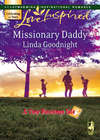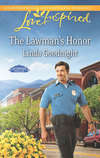Czytaj książkę: «Missionary Daddy»
Missionary Daddy
Linda Goodnight

Special thanks and acknowledgment are given to
Linda Goodnight for her contribution to the
A TINY BLESSINGS TALE miniseries.
Contents
Acknowledgments
Chapter One
Chapter Two
Chapter Three
Chapter Four
Chapter Five
Chapter Six
Chapter Seven
Chapter Eight
Chapter Nine
Chapter Ten
Chapter Eleven
Chapter Twelve
Chapter Thirteen
Chapter Fourteen
Chapter Fifteen
Chapter Sixteen
Chapter Seventeen
Acknowledgments
A special thanks to my daughter, Sundy,
for sharing her experiences as a missionary
to Africa as well as her counseling expertise
with those suffering from anorexia and bulimia.
Also to fellow writer and former model
Terri Reed, and to another writing buddy,
Shirley Jump, whose years in the television
industry provided the finishing touches.
And as always, to the children of the world
who wait. I’m praying for you.
Chapter One
One year ago, Africa
“I’m going. Either with you or alone, but I’m going.”
A determined Samantha Harcourt ignored her driver’s coming protest and slipped into the back seat of the tiny European car. After three days on the South African coast, she’d seen nothing but the posh resort hotels along the ruggedly beautiful beaches. The real Africa was out there somewhere and she aimed to see it. Today.
Alfred, the ebony-faced driver, had driven her and the other models around the private beach areas rented by Sports Stuff Magazine for their annual swimsuit edition, but no one else had requested to go beyond the tourist areas. Even now, with the modeling shoot about to wrap and go back to America, the other models lounged on the white sand beaches, uninterested in the rest of the country.
“I may only be here once, Alfred. Please. I want to see the real Africa.”
The man sat like a stone at the wheel.
“I was instructed not to take you there,” he said, his accent an interesting mix of African dialect and clipped British tones.
Sam sighed and peeled off a hundred-rand note, offering it without further comment.
Alfred shook his head but took the money and cranked the engine.
Satisfied, Samantha sat back to enjoy the scenery, digital camera at ready. She wasn’t sure what to expect. Her life as a fashion model had taken her around the world and to many diverse places, but this was her first trip to Africa.
“Do you know a market where I can buy a ceremonial mask?” She collected masks of all kinds and would love one from this continent.
Alfred’s dark eyes flashed in the mirror. “I will get you a mask. The markets aren’t safe for tourists.”
Sam figured that was the best she could hope for. “I’d appreciate that, Alfred. Thank you.”
“We go back now. Yeah.”
She’d been warned that the crime rate was high in some areas, but…
“I want to see where the everyday people of Africa live.”
Alfred’s wrinkled brow deepened to cornrows, but he drove on.
Within ten minutes, she understood his reluctance. Wealthy mansions gave way to shanties—makeshift dwellings patched together with cardboard, tin, bricks and a hodgepodge of found materials.
Poverty, astonishing and terrible, spread out in a wide swath. Bony children played in the unending dirt with sticks and rocks. Adolescent girls carried water from muddy ponds while women hung meager laundry across strips of bowing rope or string. It was a scene of inexpressible squalor.
A deep sense of shame shifted over Sam, so profound that her stomach rolled. All she’d ever done was pose for a camera and look pretty. In her entire life, she’d done nothing that mattered. Yet she had so much, and these people had so little.
“We go back now? Yeah,” Alfred said again.
Sam turned horrified eyes to him. “No. Keep driving.”
Something inside her was stirring, some innate longing. Turning back now was out of the question.
In the distance, a ways from the bulk of the desolate township, she spotted activity of a different kind. Someone was constructing a building.
Leaning forward, Sam squinted toward the structure. Habitat for Humanity, perhaps? Did they work in foreign lands?
She pointed. “Take me there.”
“The American missionary.” Alfred nodded, this time approving her idea. “He is building a fine, new orphanage for the little ones.”
An orphanage. Children without families. Sam gripped the edge of the window; the inner churning grew worse by the minute. Her family hadn’t been that supportive, but she’d grown up with every material advantage. She could barely conceive of children with nothing to depend upon but the kindness of strangers.
She glanced down at her acrylic nails, safari shorts and designer top. A pair of gold bracelets—twenty-four carat speckled with costly gems—jangled at her wrist. Matching earrings dangled from her ears. Her tiny bag was Gucci, her sandals Prada. Her clothes and jewelry would probably pay for building that small orphanage. This morning the attire had been perfection, a reflection of the persona she cultivated. Now, the shallow trappings of a pampered life brought only shame.
Eric Pellegrino thought the African sun had finally gotten to him. Standing with a brick in one hand and a trowel in the other, he stared at the tall blond apparition stepping out of the tiny car. Dust swirled up around her, making the scene even more surreal. A mirage. That was what she had to be. Not the team leader who’d been felled by traveling sickness.
“Eric, Eric.” Amani, the six-year-old orphan boy who had long since won his heart, came running around the side of the building. His little brother, Matunde, only three, ran behind him. Amani pointed to the car. “Company. More workers.”
Both boys clapped their hands with glee and rushed the vehicle.
Eric figured he should close his gaping mouth and go rescue the woman before Matunde and Amani scared her off. Missions’ teams arrived every summer to help the orphanage on a short-term basis, mostly youth groups with little knowledge but great enthusiasm. This year they were adding on to the tiny, overcrowded orphanage.
One thing he’d learned after nearly six years in Africa, never turn down a gift or an offer of help. If she was here, she must be feeling better.
He was the one suffering from a sudden attack of breathlessness.
He handed the mudded brick to one of the teens and went to greet the newcomer. The orphans, always fascinated by a vehicle or company, swarmed the car. When several children wrapped around her legs, the woman bent low and hugged them. Eric’s heart bumped. Anyone who cared about the kids was automatically on his happy list.
His newest helper was tall and tan and willowy, pale blond hair slicked back from a clean, natural face into a thick ponytail. Elegantly groomed eyebrows arched above a pair of stunning silver-blue eyes that gazed at him with undisguised interest. With her delicate beauty and her fancy clothes, she looked as out of place as a princess at a mud-wrestling contest.
He, who’d learned the hard way not to be misled by exterior appearances, couldn’t stop staring.
Sure, she was beautiful, but the instant connection was more than that. It was as if he knew her already, as if he knew the things that would make her laugh…and cry, as if he looked into the face of his future.
With a shake of his head, he dispelled the odd sensation and stepped forward.
“I’m Eric,” he said. “Director here. These are my kids. Or rather the orphanage charges. I call them my kids.”
Smiling down at the children, the mirage untangled herself and offered a well-groomed hand. “I’m Sam.”
Her skin felt the way he’d known it would. Soft and pampered, but under-girded with steel, even if those fingernails wouldn’t last ten minutes. “Welcome to Ithemba House. Feeling better?”
She blinked at him. “I beg your pardon?”
Matunde and Amani already had her hands, tugging toward the structure.
“The mission’s director called. Said you were under the weather. International travel does that to a lot of people.”
“Oh. Right. Sure. I—” She looked around at the driver and then back at Eric. A strange expression, almost of decision, came and went. Eric understood. She wouldn’t be the first who was scared off by the sheer enormity of the problems he faced every day. But Eric hoped she would stay for more reasons than he could articulate.
Finally, she let the boys pull her forward. “So where do I start?”
Eric jerked his head toward the building. Even seriously overdressed for the task, the woman had grit. He liked her attitude. Ah, who was he kidding? Sam intrigued and attracted him. There was something very special about her. “Some of the other girls are around back mixing mud for the bricks.”
As much as he’d like to forget work today and spend it getting to know her better, they had a job to do. He figured a job away from him was the best place for lovely Sam.
“Okay,” she said. “Just a second.” With the boys in tow, she went back to the car and spoke to the driver. From the man’s expression, he wasn’t happy with his passenger, but he nodded and drove away.
Led by the adorable little boys, Sam joined the group of laughing, sweating teens at the far end of the orphanage. Though she’d never done construction work, neither had any of the other girls. And she was a master at faking it. With no regard to her clothes or her jewelry, she set to work. The workers were chatty, and quickly filled her in on their African adventure. Having only just arrived, they were from a church in Texas that supported the orphanage on a regular basis.
When she brought the topic around to the missionary, a couple of the girls giggled. One said, “Cute, huh?”
Sam only smiled but she had to agree. Eric was not only darkly handsome, he radiated a contagious charm and energy. She thought it was funny that he had mistaken her for one of these kids, considering she was nearly twenty-seven and they were all teenagers. But she let the misunderstanding ride, embarrassed to admit what she did for a living. He’d probably sneer if she told him. Compared to his work, hers was meaningless.
Stirring a bucket of a substance resembling white concrete, she glanced Eric’s way. At any one time, several small children swarmed around him, pulling on his legs and arms. Over and over, with infinite patience, he stopped whatever he was doing to acknowledge them. And she’d never seen anyone work so hard and laugh so much.
Eric was a very interesting man. And she wanted to know him better, if for no other reason than to understand more about the mission.
As he struggled to lift an oversized window into place, Sam saw her chance and hurried over to help him hoist one side.
“Looks like you could use an extra hand.”
“Thanks,” he grunted as together they shoved the framed glass into the open wall. “This window is bigger than usual but electricity here is iffy. We need the sunlight for the kids’ studies.”
“The kids go to school here?”
“Yep. No place else to go.”
Sam leaned her body weight against the window frame while Eric made adjustments. “How many kids live here?”
“Ten.” He used his fist to pound a corner into the tight space. “But as soon as these new rooms are ready we can take in twenty more plus two caregivers.”
She was horrified. “Are there that many orphans?”
“Not even a drop in the bucket to the number out there with no place to go.” He motioned with his chin. “Hand me that bag of nails, will you?”
Sam complied and found herself assisting him as he hammered the window into the wall. Her mind couldn’t wrap itself around the idea of so many children alone.
“How do you do this? I mean, there’s so much need.”
“It’s tough sometimes, but I love what I do.” He wiped a muscled forearm across a face damp with hard work and summer heat. “Africa has taught me to trust God. Really trust Him. When we need something, He always comes through.”
Well, what had she expected? The man was a missionary. Sam, who wasn’t sure what she believed, had never been a religious person, had never been around any to speak of, though her sister Ashley had become a Christian after the birth of her son a couple of years ago. Sam was still curious about that turn of events.
“How long have you been here?”
“Nearly six years.”
“All that time.” She was amazed. Years without microwaves or hot showers or air-conditioning.
She took the extra hammer and tried to drive a nail. It bent double. “Do you ever go home?”
“I furlough at least once a year. Lately—” His face clouded for a second as if he wanted to share something worrisome. But instead he shook his head and laughed. “I see you’ve done a lot of carpentry work.”
Sam grinned. “Tons. Can’t you tell by my finesse?”
Eyes twinkling, the charming missionary flipped his hammer around to the claw end and extracted the nail with one fluid twitch of a powerful wrist.
“I know you’re a master craftsman and all,” he said, still grinning, “but let me show you the way we poor African missionaries hammer a nail.”
“I’m all ears,” she answered, extending the hammer. “Or maybe I should say all thumbs?”
Eric made a huffing noise in appreciation of her humor. Sam’s mood spiraled upward. She liked this guy.
“Strike with your arm, not your wrist. You’ll get more power that way,” he was saying as he leaned in from behind to demonstrate the correct way to hold a hammer.
“Where are you from, Sam?” Eric asked as they worked.
“Chicago. Virginia, originally. Why?”
He tilted his head. “You don’t exactly look like the missions type. What do you do back in Chicago?”
A frisson of embarrassment kept her from telling him. Her work was so superficial. “Just a job. Nothing special.”
But what Eric did was special. The most special work she’d ever witnessed. This man and his team of helpers were making a difference in human lives every single day.
Together they finished securing the window. A couple of teenage boys came around the building to inquire about lunch.
“The food bus arrives at noon,” Eric told them. “They should be here any minute.”
“Don’t you have food here?”
“Sure, but we’ll eat later. The food van is for the others.”
Sam didn’t recall seeing any others, but she didn’t argue on a day filled with interesting occurrences.
The sun was high in the sky and the heat scorching, much hotter than along the beach. Even though she was an exercise fiend, Sam doubted if she’d ever perspired quite this much. She pulled her damp cotton shirt away from her body, letting cool air rush in. She should be exhausted and ready to escape. Instead she felt an energy rush and deep satisfaction.
A white van chugged down the road, horn blaring in a jolly rhythm. Suddenly, the landscape erupted with humanity, mostly children. They came running from all directions, feet bare, clothes in pitiful condition, smiles wide, carrying containers of every sort from a regular bowl to a discarded lid.
The teenagers appeared as startled as Sam. Eric clapped his hands and motioned toward the awning being erected by staff members. The chattering children crowded in to sit on the hard-packed ground.
During the next few minutes, Eric, with children in his lap and hanging over his back, spoke to the group about Jesus’s love for them. The simple, sweet, spiritual message brought a lump to Sam’s throat. She hoped it was true. These precious babies needed someone big and strong to love them.
Two of the teenagers from the mission team presented a children’s song, urging the sea of faces to sing and clap. Laughter and energy rippled through the clearing. For all the despair, these people could still find joy, something sorely missing in her life most of the time.
A child no more than three had chosen Sam’s lap and cuddled close to play with her shining bracelets. Flies swarmed, the sun scorched and dirt was everywhere. But Sam was oddly content.
When the brief Bible lesson ended, a makeshift table was loaded with an enormous pot of porridge-looking stuff.
“Can you handle this?” Eric asked, offering the ladle to Sam.
“I may not be able to hammer but I can dip,” she said and was rewarded with his wide grin.
“I knew you were a talented woman. Today the dipper. Tomorrow the roof.”
Tomorrow. She didn’t know how to tell him there would be no tomorrow.
A sea of thin, hungry faces swarmed the table, bowls upraised, amazingly considerate of one another. Though clearly in need of food, no one pushed the other out of the way. Most even took their meager rations and headed home to share with other family members. When Sam heard that, she almost cried.
The rest of the group handed out slices of white bread while she filled containers. Eric worked beside the orphan children, quietly directing them to be of service to the others. Not a one argued or insisted on eating first.
Sam dipped until the pot emptied. Still the children came.
“We need more,” she said.
The van driver shrugged. “There is no more.”
With a sinking feeling, she scraped the remains into one final cup and watched with heavy heart as the latecomers trudged away empty-handed but uncomplaining. The message was clear: such was the way of life in Africa.
Eric appeared at her side and draped an arm comfortingly over her shoulders. He brought with him the pleasant scent of healthy, hardworking male. “You can’t let it get to you.”
Hot and sticky and sad, she stared bleakly at the last child ambling down the dusty road, empty container dangling from his fingertips. “Some went away hungry.”
“But many didn’t. You have to look at the good you’ve done instead of what you can’t do. That’s Africa.”
“Can’t we get more food out here?” She had money. She could buy whatever they needed.
“The town missionaries bring what they can every day, but they have people inside the city to feed, as well.”
She had to find a way to help. To make a difference in these precious lives. Maybe she couldn’t change things today, but some day…
“Come on,” Eric said. “Zola has lunch for the rest of us inside.”
Food held no appeal for Samantha. These children needed to eat far more than she did. She pinched the skin on her upper arm, dismayed to find a fleshy strip of triceps. The negative voices started up inside her head. Too fat. Ugly. Worthless.
With the skills she’d developed over several years of coping, she pushed the thoughts away and concentrated on feeding the orphans. According to the doctors, her weight was finally at a semi-healthy level, whether she believed it or not.
Along toward sunset, a van rattled down the road to take the teenagers back to their base camp inside the city.
Sam didn’t go with them.
“The driver who brought me is coming back later,” she said.
That was fine with Eric. He could use her help getting the kids washed, read to and down for the night. And he enjoyed the prospect of spending a little one-on-one time with the sweet and lovely Samantha. Broken fingernails aside, she’d proven herself to be a real trooper all day.
“I’ve never seen anything quite so brave and wonderful as these children,” Sam said later as they settled outside in the evening with bottles of clean water. Even the water struck her as more significant than ever before. Here, water was at a premium all the time.
Eric angled toward her in the semidarkness, water bottle dangling from one hand. “They were fascinated with your hair. I doubt they’d ever seen so much long, straight, white hair. It was nice of you to let them touch it.”
Her ponytail had long since pulled loose on the sides and Eric was as tempted as the children to get his hands on the flowing blond silk.
She brushed the strands back with both hands. “I didn’t mind. The kids are adorable.”
“So what do you think of Africa so far?”
The easy smile disappeared. “The people are gentle and friendly, but the poverty is unbelievable. And the orphans…”
Eric knew exactly what she meant. Sometimes the conditions overwhelmed. If God hadn’t called him here, he would have given up a long time ago. But the Lord and his heart wouldn’t let him.
“Every day the problem grows worse. More parents die of AIDS or malaria. More children left alone. The African people take care of one another when they can, but most barely survive. How can they take in an orphaned child?”
He shook his head, aware that the worry he hid from the kids had seeped through.
Sam’s smooth, soft hand touched his. “Your work here is wonderful, Eric. You’re doing all you possibly can.”
But it wasn’t enough.
Sweet Sam was trying to encourage him and the thought both moved and amused Eric. He was generally the comforter, the strong one. But he was grateful that God had sent this particular missions’ worker halfway across the world just when he needed encouragement.
“If only those with the financial means would do more,” he muttered. But in his experience, the rich just got richer. Africa was proof of that. “You drove through the townships to get here. You saw the line between the haves and have-nots—a mansion on one side of the road and hovels on the other.”
“It’s shocking, isn’t it?”
Resentment burned the back of his throat like acid. “There are people in this country wealthy enough to solve the hunger problem, yet they won’t even cross the road to offer a loaf of bread to a needy family.”
It was the regular working folks, grandmas on fixed incomes, people of modest means who supported the fatherless. They were the ones with compassion. The wealthy of the world were too busy blessing themselves.
“The Bible said it’s easier for a camel to go through the eye of a needle than for a rich man to enter heaven. All you have to do is look around to understand that.”
Sam had grown very quiet and Eric regretted his outburst. He bumped her hand with his water bottle. “Sorry. I didn’t need to dump my worries on you.”
“It’s okay.” But her soft voice held a sadness he couldn’t interpret.
For the past few months he’d been contemplating a decision about his work here. He’d prayed and studied the Bible, asked for opinions from the missions’ board and the African consulate. Still, he hadn’t decided how best to help the orphans he loved so much. Sometimes the frustration with people who could give and didn’t built up until he said too much.
“The orphanage meets the basic needs,” he said. “We teach them about Jesus, love them all we can, but children need more. They need families.”
“Matunde and Amani seem to think you are their family.”
He chuckled softly. “I guess I am. They’ve been with me since their mother died when Matunde was born. Afterward, I won their father to the Lord. When he got sick, too, he brought baby Matunde and his big brother here.”
“And you took them in.”
He took a swig from his water bottle, remembering the desperately ill man, weak and gaunt, who’d walked miles to ensure his children would be cared for. “It was their father’s last request. I couldn’t refuse, even though we normally refer infants to a baby hospital. In fact, Matunde was the first and only baby we’ve had here.”
“That’s why he’s crazy about you. You probably diapered the little guy.”
“I did. Clumsy as an ox, but he and I muddled through until Zola came along to help.”
Perhaps that was the reason he was so attached to the two brothers. He was the only parent they remembered. The thought of leaving them behind tore at him like tiger’s claws. The boys were part of his indecision.
“What you do is amazing. A true gift. I wish—” She let the thought trail away, saying instead, “How much longer until the construction is complete?”
“A week maybe. Mission teams generally work fast. All of you are doing a great job.”
She held up her bruised thumb. “You call this great?”
“Sure,” he said, bumping her with his shoulder. “A regular, bang-up job.”
She rolled her silvery eyes, but they both chuckled softly at the joke.
“Why do you call the orphanage Ithemba House?”
“Ithemba means hope in several African languages. Sometimes hope is all I can give them.”
“Hope is everything, Eric,” she said in a soft voice. “Absolutely everything.”
And he knew that Sam understood what so many others didn’t about missionary work. Without the hope that God had a plan and purpose even for the lowliest, humankind was lost.
Night sounds closed in around them. The symphony of a dozen frog species. The clear, pure trill of night birds. The calls and cries of nocturnal creatures on the move. Noises as familiar to Eric as the lilting cadence of the many African dialects.
A scream ripped the darkness. Sam yipped and clutched his arm. “What was that?”
The eerie howl and piercing scream came again.
Sam had moved so close, Eric was reluctant to answer. But in fairness, he admitted, “A jackal. No harm to us.”
He felt her relax, but she didn’t scoot away and he was glad. They sat close, her hand on his arm.
“The stars look so near,” she whispered. “I feel as if I can reach out and touch them.”
“Want me to get one for you?”
She turned her head the slightest bit, bringing her face close. Her full, bowed lips lifted in a soft smile.
“Would you?”
He was a missionary, a man not given to impulse, a man very careful not to overstep his bounds, but he wanted to kiss the lovely Sam.
He shifted around toward her, lifting one hand to brush a stray lock behind her ear. As he’d expected, her hair was silk. In the moonlight, their eyes met and held.
Then the sweep of car lights found them and Eric moved away, both thankful and sorry for the interruption.
“There’s my ride,” Sam said. Eric leaped to his feet and helped her up. Her skin, even after a hard day’s work, was as silky as her hair. Regretfully, that would change by the time her mission team left Africa.
They walked to the car, still holding hands.
“Thanks for your help today.”
She shook her head. “No. Thank you. I learned so much. I never—” Her voice choked. Eric moved closer, but Sam backed away and reached for the car door. “Bye, Eric. Today was wonderful.”
As the car pulled out, Eric raised a hand. “See you tomorrow.”
But he didn’t. In fact, Samantha never returned to the orphanage again. Eric was not only disappointed, he was bewildered to learn that Sam was not a part of the missions’ team. The team didn’t know her any more than he did.
No one could figure exactly what had happened. One thing for certain, she’d made an impression on him.
Eric spent a couple of days talking to God about the incident. Because for that one, beautiful day, he had almost believed in love at first sight.
And he didn’t even know her last name.
Darmowy fragment się skończył.



















